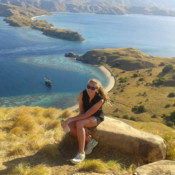The Blue Marine Foundation (BLUE) are a pretty marvellous bunch. Their chief mission is to tackle overfishing across the globe and they aim to place 30% of the world's oceans under protection by 2030. In part one of our Q&A with Vivienne Evans, BLUE's Maldives Project Manager, we discovered how she got into marine conservation. In our latest Q&A, discover why groupers are so significant to the Maldives…

What are the biggest environmental issues facing the Maldives?
Only one percent of the Maldives is land and 85 percent of this is already in use, yet a further 100 resorts are already under construction. There simply isn't enough land to accommodate such increased development so the Maldives is having to undergo permanent land restructuring. When these resorts are constructed or new land is created, often lagoon sand is dredged and placed on top of living reefs which literally smothers and kills living corals.
The demand for fresh reef fish for tourists to eat is also contributing to reef degradation. Reef fish are generally quite long-lived species and they don't breed until they are quite old which means that populations cannot withstand fishing pressure. This fishery is totally unregulated. Resorts and guest houses can sell almost any reef fish they want to and they can sell as many as they like, even those which are known to be threatened, like grouper.
However, the real 'elephant in the room' is climate change. Coral reefs protect the low-lying islands of the Maldives. They are a physical barrier and protect the islands from eroding. When reefs break down structurally and degrade, that protection is lost. 80 percent of land in Maldives is less than one metre above mean sea level and on the current climate trajectory, sea level in the Maldives is expected to rise by half a metre by 2100. When you consider the predicted increase in frequency of extreme weather events and natural disasters, this threatens the very survival of the country.

Why is protecting the grouper so significant for the Maldives marine ecosystem?
Groupers are top predators on coral reefs and they play an important role in the community dynamics of Maldivian reefs. In addition to this, scientific research has shown that coral reefs with intact fish populations and trophic linkages resist the effects of climate change far better than those reefs with depleted populations, and can recover much faster. The coral bleaching event in 2016 killed up to 75 percent of corals in the Maldives and these events are predicted to increase. Maintaining healthy populations of groupers and other fish on reefs will ensure that coral reefs in Maldives have a greater chance of recovering from these disasters in future.

Why is grouper conservation so close to your heart?
I lived in the Maldives for over a year when I was working on this project. I dived and snorkelled on degraded coral reefs with almost no groupers and I spoke with fishermen who recalled the impact the demise of this fishery has had on their livelihoods. I want to ensure that grouper populations and coral reef ecosystems as whole ecosystems are managed for the Maldives and its people.

What part has Six Senses Laamu played in this? What conservation policies and practices has the island incorporated?
Resorts in the Maldives thrive off the marine environment but so few of them make any real effort to protect and preserve it. Six Senses Laamu funded a large portion of our work in 2016 and 2017 and in addition to supporting us, they support two other marine conservation charities. They also give back to the Maldivian community. They support and employ Maldivian marine biologists; 55 percent of their staff are Maldivian and, of that, 66 are from the same atoll where the resort is. Consequently, the resort has good relations with local communities, which in part enabled our outreach programme to be so successful. Six Senses Laamu is setting an example for other resorts in the Maldives and I wish that more resorts were so environmentally and socially responsible.

What have been your key findings so far?
We discovered seven new grouper spawning aggregation sites that had never been documented before and we also identified, for the first time, the lengths at which specific groupers can breed. Collecting this evidence has enabled us to advise the government on appropriate fisheries policy to limit the catch of immature fish and call for the protection of grouper spawning grounds.

What’s been your favourite moment working on this project?
It's so hard to choose one specific moment. I feel absolutely privileged to have had the opportunity to work and live in one of the great coral provinces of the world. I will always look back on my time there with such fond memories.
Discover more about The Blue Marine Foundation and ways you can help make a difference through their website.












